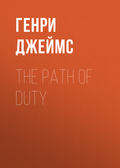
Генри Джеймс
Lady Barbarina, The Siege of London, An International Episode, and Other Tales
II
His delay in going to see her was nevertheless calculated; there were more reasons for it than we need at once go into. When he did go, however, Mrs. Headway was at home and he was scarce surprised to find Sir Arthur Demesne in her sitting-room. There was something in the air that spoke of the already ample stretch of this gentleman’s visit. Littlemore thought probable that, given the circumstances, he would now bring it to a close; he must have learned from their hostess that this welcomed compatriot was an old and familiar friend. He might of course have definite rights—he had every appearance of it, but the more they were rooted the more gracefully he could afford to waive them. Littlemore made these reflexions while the friend in possession faced him without sign of departure. Mrs. Headway was very gracious—she had ever the manner of having known you a hundred years; she scolded Littlemore extravagantly for not having been to see her sooner, but this was only a form of the gracious. By daylight she looked a little faded, but there was a spirit in her that rivalled the day. She had the best rooms in the hotel and an air of extreme opulence and prosperity; her courier sat outside, in the antechamber, and she evidently knew how to live. She attempted to include Sir Arthur in the conversation, but though the young man remained in his place he failed to grasp the offered perch. He followed but as from the steep bank of the stream, where yet he was evidently not at his ease. The conversation therefore remained superficial—a quality that of old had by no means belonged to Mrs. Headway’s interviews with her friends. The Englishman hovered with a distant air which Littlemore at first, with a good deal of private amusement, simply attributed to jealousy.
But after a time Mrs. Headway spoke to the point. “My dear Sir Arthur, I wish very much you’d go.”
The member of Parliament got up and took his hat. “I thought I should oblige you by staying.”
“To defend me against Mr. Littlemore? I’ve known him since I was a baby—I know the worst he can do.” She fixed her charming smile on her retreating visitor and added with much unexpectedness: “I want to talk to him about my past!”
“That’s just what I want to hear,” said Sir Arthur, with his hand on the door.
“We’re going to talk American; you wouldn’t understand us! He speaks in the English style,” she explained in her little sufficient way as the Baronet, who announced that at all events he would come back in the evening, let himself out.
“He doesn’t know about your past?” Littlemore inquired, trying not to make the question sound impertinent.
“Oh yes; I’ve told him everything; but he doesn’t understand. One has to hold an Englishman by the head, you know, and kind of force it down. He has never heard of a woman being—” But here Mrs. Headway checked herself, while Littlemore filled out the blank. “What are you laughing at? It doesn’t matter,” she went on; “there are more things in the world than those people have heard of. However, I like them very much; at least I like him. He’s such a regular gentleman; do you know what I mean? Only, as he stays too long and he ain’t amusing, I’m very glad to see you for a change.”
“Do you mean I’m not a regular gentleman?” Littlemore asked.
“No indeed; you used to be out there. I think you were the only one—and I hope you are still. That’s why I recognised you the other night—I might have cut you, you know.”
“You can still, if you like. It’s not too late.”
“Oh no, that’s not what I want. I want you to help me.”
“To help you?”
Mrs. Headway fixed her eyes for a moment on the door. “Do you suppose that man is there still?”
“The member of Parliament?”
“No, I mean Max. Max is my courier,” said Mrs. Headway with some impressiveness.
“I haven’t the least idea. I’ll see if you like.”
“No—in that case I should have to give him an order, and I don’t know what in the world to ask him to do. He sits there for hours; with my simple habits I afford him no employment. I’m afraid I’ve no grand imagination.”
“The burden of grandeur!” said Littlemore.
“Oh yes, I’m very grand for clothes and things. But on the whole I like it. I’m only afraid he’ll hear. I talk so very loud. That’s another thing I’m trying to get over.”
“Why do you want to be different?”
“Well, because everything else is so,” Mrs. Headway bravely pleaded. “Did you hear that I had lost my husband?” she went on abruptly.
“Do you mean—a—Mr.—?” and Littlemore paused with an effect that didn’t seem to come home to her.
“I mean Mr. Headway,” she said with dignity. “I’ve been through a good deal since you saw me last: marriage and death and trouble and all sorts of things.”
“You had been through a good deal of marriage before that,” her old friend ventured to observe.
She rested her eyes on him with extravagant intensity and without a change of colour. “Not so much, not so much!—”
“Not so much as might have been thought?”
“Not so much as was reported. I forget whether I was married when I saw you last.”
“It was one of the reports,” said Littlemore. “But I never saw Mr. Beck.”
“You didn’t lose much; he was too mean to live. I’ve done certain things in my life that I’ve never understood; no wonder others can’t do much with them. But that’s all over! Are you sure Max doesn’t hear?” she asked quickly.
“Not at all sure. But if you suspect him of listening at the keyhole I’d send him away.”
“I don’t think he does that. I’m always rushing to the door.”
“Then he doesn’t hear. I had no idea you had so many secrets. When I parted with you Mr. Headway was in the future.”
“Well, now he’s in the past. He was a pleasant man—I can understand my doing that. But he only lived a year. He had neuralgia of the heart; he left me very well off.” She mentioned these various facts as if they were quite of the same order.
“I’m glad to hear that. You used to have expensive tastes.”
“I’ve plenty of money,” said Mrs. Headway. “Mr. Headway had property at Denver, which has increased immensely in value. After his death I tried New York. But I don’t take much stock in New York.” Littlemore’s hostess spoke these last words in a tone that reeked of some strong experience. “I mean to live in Europe. I guess I can do with Europe,” she stated; and the manner of it had the touch of prophecy, as the other proposition had had the echo of history.
Littlemore was much struck with all this; he was greatly enlivened by Mrs. Headway. “Then you’re travelling with that young man?” he pursued, with the coolness of a person who wishes to make his entertainment go as far as possible.
She folded her arms as she leaned back in her chair. “Look here, Mr. Littlemore; I’m about as sweet-tempered as I used to be in America, but I know a great deal more. Of course I ain’t travelling with that young man. He’s only a good friend.”
“He isn’t a good lover?” Littlemore ventured.
“Do people travel—publicly—with their lovers? I don’t want you to laugh at me—I want you to help me.” Her appeal might, in its almost childish frankness, have penetrated; she recognised his wisdom. “As I tell you, I’ve taken a great fancy to this grand old Europe; I feel as if I should never go back. But I want to see something of the life. I think it would suit me—if I could get started a little. George Littlemore,” she added in a moment—“I may as well be real, for I ain’t at all ashamed. I want to get into society. That’s what I’m after!”
He settled himself in his chair with the feeling of a man who, knowing that he will have to pull, seeks to obtain a certain leverage. It was in a tone of light jocosity, almost of encouragement, however, that he repeated: “Into society? It seems to me you’re in it already, with the big people over here for your adorers.”
“That’s just what I want to know—if they are big,” she promptly said. “Is a Baronet much?”
“So they’re apt to think. But I know very little about it.”
“Ain’t you in society yourself?”
“I? Never in the world! Where did you get that idea? I care no more about society than about Max’s buttons.”
Mrs. Headway’s countenance assumed for a moment a look of extreme disappointment, and Littlemore could see that, having heard of his silver-mine and his cattle-ranch, and knowing that he was living in Europe, she had hoped to find him eminent in the world of fashion. But she speedily took heart. “I don’t believe a word of it. You know you’re a real gentleman—you can’t help yourself.”
“I may be a gentleman, but I’ve none of the habits of one.” Littlemore had a pause and then added: “I guess I’ve sat too much on back piazzas.”
She flushed quickly; she instantly understood—understood even more than he had meant to say. But she wished to make use of him, and it was of more importance that she should appear forgiving—especially as she had the happy consciousness of being so—than that she should punish a cruel speech. She would be wise, however, to recognise everything. “That makes no difference—a gentleman’s always a gentleman.”
“Ah, not the way a lady’s always a lady!” he laughed.
“Well, talking of ladies, it’s unnatural that, through your sister, you shouldn’t know something about European society,” said Mrs. Headway.
At the mention of his sister, made with a studied lightness of reference which he caught as it passed, Littlemore was unable to repress a start. “What in the world have you to do with my sister?” he would have liked to say. The introduction of this relative was disagreeable to him; she belonged quite to another order of ideas, and it was out of the question Mrs. Headway should ever make her acquaintance—if this was what, as the latter would have said, she was “after.” But he took advantage of a side issue. “What do you mean by European society? One can’t talk about that. It’s an empty phrase.”
“Well, I mean English society; I mean the society your sister lives in; that’s what I mean,” said his hostess, who was quite prepared to be definite. “I mean the people I saw in London last May—the people I saw at the opera and in the park, the people who go to the Queen’s drawing-rooms. When I was in London I stayed at that hotel on the corner of Piccadilly—the one looking straight down Saint James’s Street—and I spent hours together at the window there looking at the people in the carriages. I had a carriage of my own, and when I wasn’t at my window I was riding all around. I was all alone; I saw every one, but I knew no one—I had no one to tell me. I didn’t know Sir Arthur then—I only met him a month ago at Homburg. He followed me to Paris—that’s how he came to be my guest.” Serenely, prosaically, without a breath of the inflation of vanity, she made this last assertion: it was as if she were used to being followed or as if a gentleman one met at Homburg would inevitably follow. In the same tone she went on: “I attracted a good deal of attention in London—I could easily see that.”
“You’ll do that wherever you go,” Littlemore said—insufficiently enough, as he felt.
“I don’t want to attract so much; I think it’s vulgar.” She spoke as if she liked to use the word. She was evidently open to new sources of pleasure.
“Every one was looking at you the other night at the theatre,” Littlemore continued. “How can you hope to escape notice?”
“I don’t want to escape notice. People have always looked at me and I guess they always will. But there are different ways of being looked at, and I know the way I want. I mean to have it too!” Mrs. Headway prettily shrilled. Yes, she was full of purpose.
He sat there face to face with her and for some time said nothing. He had a mixture of feelings, and the memory of other places, other hours, was stealing over him. There had been of old a very considerable absence of interposing surfaces between these two—he had known her as one knew people only amid the civilisation of big tornadoes and back piazzas. He had liked her extremely in a place where it would have been ridiculous to be difficult to please. But his sense of this fact was somehow connected with other and such now alien facts; his liking for Nancy Beck was an emotion of which the sole setting was a back piazza. She presented herself here on a new basis—she appeared to want to be classified afresh. Littlemore said to himself that this was too much trouble; he had taken her at the great time in that way—he couldn’t begin at this late hour to take her in another way. He asked himself if she were going to be a real bore. It wasn’t easy to suppose her bent on ravage, but she might become tiresome if she were too disposed to be different. It made him rather afraid when she began to talk about European society, about his sister, to pronounce things vulgar. Littlemore was naturally merciful and decently just; but there was in his composition an element of the indolent, the sceptical, perhaps even the brutal, which made him decidedly prefer the simplicity of their former terms of intercourse. He had no particular need to see a woman rise again, as the mystic process was called; he didn’t believe in women’s rising again. He believed in their not going down, thought it perfectly possible and eminently desirable; but held it was much better for society that the divisions, the categories, the differing values, should be kept clear. He didn’t believe in bridging the chasms, in muddling the kinds. In general he didn’t pretend to say what was good for society—society seemed to him rather in a bad way; but he had a conviction on this particular point. Nancy Beck going in for the great prizes, that spectacle might be entertaining for a simple spectator; but it would be a nuisance, an embarrassment, from the moment anything more than detached “fun” should represent his share. He had no wish to be “mean,” but it might be well to show her he wasn’t to be humbugged.
“Oh if there’s anything you want you’ll have it,” he said in answer to her last remark. “You’ve always had what you want.”
“Well, I want something new this time. Does your sister reside in London?”
“My dear lady, what do you know about my sister?” Littlemore asked. “She’s not a woman you’d care in the least for.”
His old friend had a marked pause. “You don’t really respect me!” she then abruptly and rather gaily cried. It had one of her “Texan” effects of drollery; so that, yes, evidently, if he wished to preserve the simplicity of their former intercourse she was willing to humour him.
“Ah, my dear Mrs. Beck—!” he vaguely protested, using her former name quite by accident. At San Pablo he—and apparently she—had never thought whether he respected her or not. That never came up.
“That’s a proof of it—calling me by that hateful name! Don’t you believe I’m married? I haven’t been fortunate in my names,” she pensively added.
“You make it very awkward when you say such mad things. My sister lives most of the year in the country; she’s very simple, rather dull, perhaps a trifle narrow-minded. You’re very clever, very lively, and as large and loose and free as all creation. That’s why I think you wouldn’t like her.”
“You ought to be ashamed to run down your sister!” Mrs. Headway made prompt answer. “You told me once—at San Pablo—that she was the nicest woman you knew. I made a note of that, you see. And you told me she was just my age. So that makes it rather inglorious for you if you won’t introduce me!” With which she gave a laugh that perhaps a little heralded danger. “I’m not in the least afraid of her being dull. It’s all right, it’s just refined and nice, to be dull. I’m ever so much too exciting.”
“You are indeed, ever so much! But nothing is more easy than to know my sister,” said Littlemore, who knew perfectly that what he said was untrue. And then as a diversion from this delicate topic he brought out: “Are you going to marry Sir Arthur?”
“Don’t you think I’ve been married about enough?”
“Possibly; but this is a new line, it would be different. An Englishman—that’s a new sensation.”
“If I should marry it would be a European,” she said judiciously.
“Your chance is very good—they’re all marrying Americans.”
“He would have to be some one fine, the man I should marry now. I have a good deal to make up, you know. That’s what I want to learn about Sir Arthur. All this time you haven’t told me.”
“I’ve nothing in the world to tell—I’ve never heard of him. Hasn’t he told you himself?”
“Nothing at all; he’s very modest. He doesn’t brag nor ‘blow’ nor make himself out anything great. That’s what I like him for: I think it’s in such good taste. I do love good taste!” said Mrs. Headway. “But all this time,” she added, “you haven’t told me you’d help me.”
“How can I help you? I’m no one here, you know—I’ve no power.”
“You can help me by not preventing me. I want you to promise not to prevent me.” She continued to give him her charming conscious eyes, which seemed to look far into his own.
“Good Lord, how could I prevent you?”
“Well, I’m not quite sure of how. But you might try.”
“Oh I’m too lazy and too stupid,” Littlemore said.
“Yes,” she replied, musing as she still looked at him. “I think you’re too stupid. But I think you’re also too kind,” she added more graciously. She was almost irresistible when she said such a thing as that.
They talked for a quarter of an hour longer, and at last—as if she had had scruples—she spoke to him of his own marriage, of the death of his wife, matters to which she alluded more felicitously (as he thought) than to some other points. “If you’ve a little girl you ought to be very happy; that’s what I should like to have. Lord, I should make her a nice woman! Not like me—in another style!” When he rose to leave her she made a great point of his coming again—she was to be some weeks longer in Paris. And he must bring Mr. Waterville.
“Your English friend won’t like that—our coming very often,” Littlemore reminded her as he stood with his hand on the door.
But she met this without difficulty. “I don’t know what he has to do with it.”
“Neither do I. Only he must be in love with you.”
“That doesn’t give him any right. Mercy, if I had had to put myself out for all the men that have been in love with me!”
“Of course you’d have had a terrible life. Even doing as you please you’ve had rather an agitated one,” Littlemore pursued. “But your young Englishman’s sentiments appear to give him the right to sit there, after one comes in, looking blighted and bored. That might become very tiresome.”
“The moment he becomes tiresome I send him away. You can trust me for that.”
“Oh it doesn’t matter after all.” Our friend was perfectly conscious that nothing would suit him less than to have undisturbed possession of Mrs. Headway.
She came out with him into the antechamber. Mr. Max, the courier, was fortunately not there. She lingered a little; she appeared to have more to say. “On the contrary he likes you to come,” she then continued; “he wants to study my friends.”
“To study them?”
“He wants to find out about me, and he thinks they may tell him something. Some day he’ll ask you right out ‘What sort of a woman is she anyway?’”
“Hasn’t he found out yet?”
“He doesn’t understand me,” said Mrs. Headway, surveying the front of her dress. “He has never seen any one like me.”
“I should imagine not!”
“So he’ll just try to find out from you.”
“Well then he shall find out,” Littlemore returned. “I’ll just tell him you’re the most charming woman in Europe.”
“That ain’t a description! Besides, he knows it. He wants to know if I’m respectable.”
“Why should he fuss about it?” Littlemore asked—not at once.
She grew a little pale; she seemed to be watching his lips. “Well, mind you tell him all right,” she went on, with her wonderful gay glare, the strain of which yet brought none of her colour back.
“Respectable? I’ll tell him you’re adorable!”
She stood a moment longer. “Ah, you’re no use!” she rather harshly wailed. And she suddenly turned away and passed back into her sitting-room, with the heavy rustle of her far-trailing skirts.







